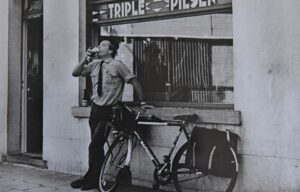Belgium country of beer
In all your wine enthusiasm, you probably lost sight of the fact that Belgium is the ultimate beer country. After water and tea, beer is the most consumed beverage in the world. And our little triangle on the North Sea is the foaming and bubbling epicentre.
Our country has a reputation to uphold. Belgian beer is celebrated far and wide, across every corner of the six continents. Belgium is considered to be the ‘beer paradise’ by beer lovers. Ask any tourist about the typical characteristics of Belgium, and you will hear about Bruges, our refined chocolate, the Red Devils or more recently Nafi Thiam and Remco 🙂 and of course: our beer. But is there really such a thing as ‘Belgian beer’? And can Belgium really claim the predicate ‘world’s best beer country’? Yes, however, the answer is more nuanced than that. To truly understand Belgian beer culture, we need to consider various geographical, historical, religious, political, and legal aspects.
The beer belt 
Belgium belongs to the so-called ‘beer belt’, a wide strip that crosses Europe from east to west. Our country has the necessary raw materials, such as barley and hops, to produce beer. Moreover, some regions are renowned for their excellent water quality. For instance, Spa has become a household name in the world of mineral water and wellness centers, thanks to the famous springs in the Walloon town of Spa.
Over the centuries, Belgium has been constantly occupied by various foreign powers: Romans, Franks, French, Spanish, Austrians, Germans… and yes, even the ‘Dutch’ have held sway in our regions. Our reaction to this was twofold: on the one hand, we adopted the good elements and integrated these influences into our (beer) culture. On the other hand, we stubbornly stuck to our (beer) traditions to preserve our individuality. Some historians even see beer drinking as a form of resistance, though we prefer not to take that idea too far..
Trappist beer
 Six of the ten Trappist breweries (Achel, Chimay, Orval, Rochefort, Westmalle, and Westvleteren) are located on Belgian soil. This is no coincidence. Catholic Belgium served for centuries as a safe haven for religious communities persecuted in their home countries. Our northern (Netherlands) and eastern neighbors (Germany) embraced Protestantism, while in turbulent France, the church was often the target of criticism. Many monks found a second home in our regions. Since beer was the quintessential drink of the people, these newcomers dedicated themselves to the craft of brewing—to our great delight. Incidentally, the two Dutch Trappist breweries are just a stone’s throw from the Belgian border.
Six of the ten Trappist breweries (Achel, Chimay, Orval, Rochefort, Westmalle, and Westvleteren) are located on Belgian soil. This is no coincidence. Catholic Belgium served for centuries as a safe haven for religious communities persecuted in their home countries. Our northern (Netherlands) and eastern neighbors (Germany) embraced Protestantism, while in turbulent France, the church was often the target of criticism. Many monks found a second home in our regions. Since beer was the quintessential drink of the people, these newcomers dedicated themselves to the craft of brewing—to our great delight. Incidentally, the two Dutch Trappist breweries are just a stone’s throw from the Belgian border.
The Influence of Politics and Legislation
As always, politics played a role. Every village of any size had at least two breweries: one with a Catholic signature and one with a liberal or socialist background. Treating ‘pints’ proved a powerful weapon in election campaigns. In many cases, the brewer was also the mayor. A good tradition, if you ask me-fresh, hoppy beer rather than political messages that sour.
From politics to government intervention is usually just a small step. The Vandervelde Act of 1919 banned the serving of liquor in pubs. This law was introduced in response to the dire situation at the time: workers were paid off after a long working week at the local pub, often owned by the patron. Tired men with money in their pockets in a pub full of friends formed an explosive cocktail. The result: drunken men who returned home penniless, abused their wives, and plunged their families into misery. The law was supposed to address this situation and curb alcoholism among the impoverished population.
Brewers saw their opportunity and launched beers with higher alcohol volume. Some great classics, such as Duvel, Westmalle Tripel, and Bush by Dubuisson, saw the light of day during this period. Although the Vandervelde Act ultimately turned out to be a slap in the face, we still owe some excellent beers to this government intervention.
Belgian Brewers: Freedom and Creativity
Compared to their German and English counterparts, our brewers enjoyed relatively more freedom. German brewers were confined by the strictures of the Reinheitsgebot (which allowed only hops, water, malt, and yeast). This law was only partially repealed in 1987 under pressure from the EU. English brewers groaned under the weight of high alcohol taxes. Starting in 1880, Prime Minister Gladstone based these taxes on the strength of the beer rather than the malt content. The result was that low-alcohol beers became dominant in the English beer landscape.
Combine all these elements, and the foundation is laid for a thriving beer culture. Colors, aromas, flavors—Belgium can boast an enormous variety of beers, born from the ‘savoir-faire,’ passion, and unceasing creativity of our brewers. Thanks to our rich history, beer reigns supreme in Belgium.
WineWise recently started offering the brand new WSET Beer training courses. To guarantee the quality of the content, we work together with beer specialist Luc De Raedemaeker. He joined our WineWise Trainers team and will teach the beer courses.
Discover for yourself the rich world of beer and become a real beer expert!
Register for the WineWise WSET beer training course and learn all about the unique flavours, styles and traditions of beer.











